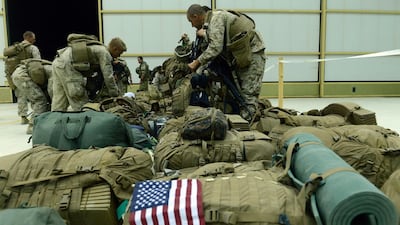The congressionally mandated Afghanistan Study Group is advising against against keeping to the May deadline for a US troop withdrawal from Afghanistan – part of an agreement reached in Qatar last year – unless the Taliban starts to live up to its end of the bargain.
The study group, hosted at the United States Institute of Peace, issued a series of five recommendations as part of the final report it released on Wednesday, including the need to “reinforce the conditionality of a final US troop withdrawal”. Congress commissioned the study group in December 2019.
“We believe that US withdrawal will provide terrorists with an opportunity to reconstitute,” said Gen Joseph Dunford, the former chairman of the joint chiefs of staff and a co-chair of the Afghanistan Study Group. “In our judgment, that reconstitution will take place within about 18 to 36 months.”
“The Afghan forces are highly dependent on US funding and operational support and will continue to be for some time to come,” he said.
The Trump administration signed a deal with the Taliban in Qatar last year that paved the way for negotiations aimed at withdrawing US troops and establishing a peace process in the country. Former president Donald Trump reduced US troops from 4,500 to 2,500 shortly after losing the election to President Joe Biden in November.
Those 2,500 troops are scheduled to leave in May under the Doha agreement. In addition to the American forces, there are approximately 11,000 Nato troops in Afghanistan.
Still, the initial agreement and a year of follow-up talks have not led to a reduction in violence. Pentagon spokesman John Kirby said last month that the Taliban has failed to keep its end of the agreement, which requires it to cut ties with Al Qaeda and end terrorist attacks.
In addition to a conditions-based withdrawal, the report suggests clarifying that the Taliban must reduce violence against the Afghan people. It also said that the US should use the prospect of lifting UN sanctions against the Taliban and include the Kabul-based government in the military-to-military channel with the group.
“The ambiguity of the Doha agreement may have been helpful in initiating dialogue, but it has proven increasingly problematic as the process moved forward and should be removed,” the study group’s report said.
The study group’s co-chairs did credit the Doha agreement with presenting a new opportunity to end the two-decade-long war, the longest-running conflict in American history.
"The opportunity that we have now as a new administration comes in with an agreement established in February 2020 is to build on the foundation of that agreement," Gen Dunford said. "We're not suggesting that we walk away from the work that has been done since February 2020.
“We’re suggesting that we now look at it clear-eyed, build upon that work, provide clarity where there may be some understandable ambiguity in the early days of the negotiation. But by clarifying the end state, leveraging the consensus that’s growing in the region and more importantly reinforcing the ongoing Afghan peace negotiation, we believe there’s an opportunity to achieve that end state.”
The report’s first recommendation illustrates a desired Afghan end state, chiefly “an independent, democratic and sovereign Afghan state with the governance, stability and security forces” to prevent terrorist groups such as Al Qaeda and ISIS from attacking the United States and its allies.
But the report’s articulated end state also calls for a fully democratic Afghan state that can “include Taliban figures”, so long as it can exercise sovereignty over its borders and protect minority and women’s rights.
The report's final three recommendations call on the US to clarify its commitment to the Afghan state, continue its diplomatic efforts to promote successful negotiations and create an overarching regional diplomatic strategy.
“This is no longer about fighting an endless war,” said Nancy Lindborg, another study group co-chair. “This is about pursuing a negotiated peace.”


